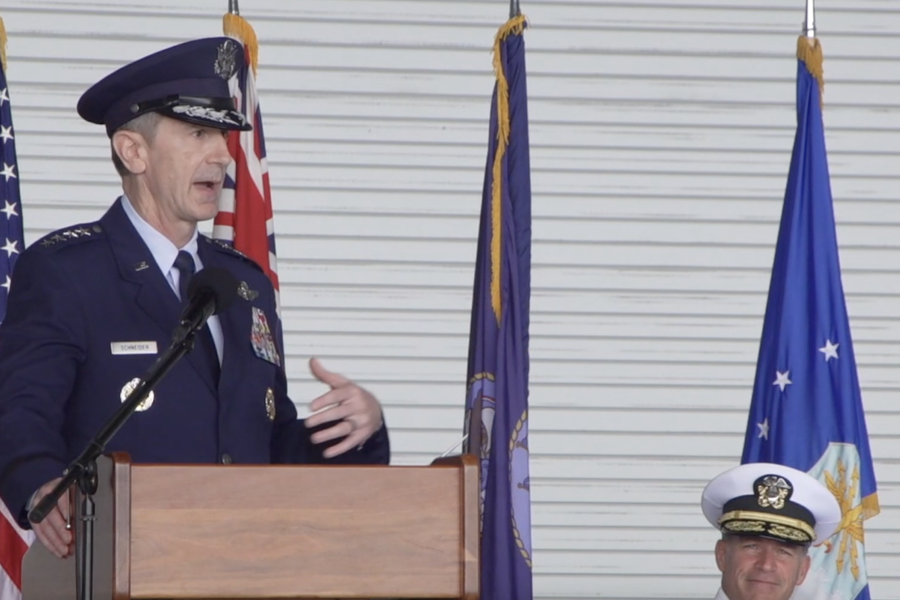Gen. Kevin B. Schneider took command of the Pacific Air Forces (PACAF), succeeding Gen. Kenneth S. Wilsbach in a Feb. 9 ceremony at Joint Base Pearl Harbor–Hickam, Hawaii.
Schneider, who comes to the job after a stint as director of staff, emphasized the strength and capability that comes from global partnerships during his first address—a key asset as the U.S. looks to combat China’s growing influence and power in the region.
“Those who seek to challenge us can never match it, they can only envy it,” Schneider said. “Our ability to work together has evolved from basic coordination to high-end interoperability in complex scenarios.”
Schneider has deep operational experience in the Indo-Pacific; he previously served as commander of U.S. Forces-Japan and the Fifth Air Force, as well as chief of staff for both PACAF and U.S. Indo-Pacific Command. Even going back to the 1990s, he served as an F-16 instructor pilot at Misawa Air Base, Japan, and Osan Air Base, South Korea.
Reflecting on his decades of service in the region, he pointed to significant changes in the security situation.
“It has become more challenging, it has become more severe, and it now carries a far higher potential for volatility,” Schneider said, expressing concerns about those seeking to undermine the rules-based international order in the Indo-Pacific theater. “They do it through economic coercion, political bullying, and military aggression. And the costs and impacts of those malign actions can be significant for those around the region. It comes with loss of sovereignty, comes with loss of transparency and government loss of economic freedoms and encroachment on human rights.”
Late last year, Chinese President Xi Jinping reportedly told President Joe Biden that Beijing intends to reunify Taiwan with mainland China, with only the timing remaining undecided. Meanwhile, a CSIS report in January counted the number of North Korea’s provocations as having tripled in the last three years.
“In the last year and a half or so, the world has become a very dangerous place,” said Wilsbach, who will go on to become the head of Air Combat Command.
“You can start with North Korea, and of course Russia is a Pacific nation as well. There’s issues in the Arctic, there’s even forces in Antarctica,” Wilsbach said. “And then of course, we have China, and China’s been very clear about their intent, their writings and their rhetoric are such that they want to control Taiwan. They’d love to do it peacefully, but they’ll do it by force, if they have to. And if you’ve watched what they’ve been doing with their military, they’ve been preparing to do it by force.”
Experts have expressed growing concern about the likelihood of China engaging in actual hostilities.
“Our job is to to convince them that that’s not a good idea. It’s called deterrence,” Wilsbach said.
Taiwan’s airpower got a recent boost when the USAF announced it had completed the $4.5 billion “Peace Phoenix Rising” program, upgrading 139 of Taiwan’s F-16 fighter jets to the advanced F-16V configuration. Next on the agenda will be 66 new F-16s delivered within the next two to three years.
Stressing his commitment to a free and open Indo-Pacific, Schneider underscored the significance of ensuring stability in the region.
“It’s not just for PACAF, not just the United States Air Force,” Schneider said. “It is a time of consequence for this region, and the world. And the actions we take now to ensure stability and deter aggression in the face of multiple growing challenges will have far-reaching, and long-lasting impacts.”
